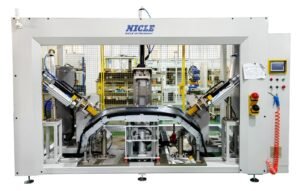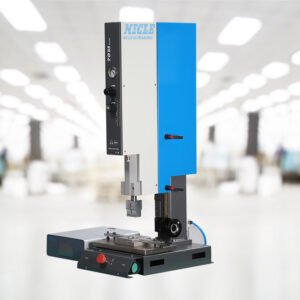In today’s rapidly evolving manufacturing landscape, the demand for efficient, reliable, and environmentally sound joining technologies is paramount. Among these innovations, the Ultraschall-Schweißmaschine stands out as a versatile and increasingly indispensable tool across a multitude of industries worldwide. Its ability to create strong, clean bonds in a variety of materials, including plastics, metals, and textiles, has fueled its adoption in diverse applications across the globe. Let’s delve into the significant role Ultraschall-Schweißmaschinen play in various countries and their key industries.
The United States: Driving Innovation in Automotive and Medical Device Manufacturing
Die United States has long been at the forefront of manufacturing innovation, and the adoption of Ultraschall-Schweißmaschinen is a testament to this. In the automotive sector, particularly in states like Michigan and Ohio, these machines are crucial for assembling interior components, dashboards, door panels, and even critical under-the-hood parts. The speed and precision offered by Ultraschall-Schweißmaschinen contribute significantly to the high production volumes and stringent quality standards of the American automotive industry. Furthermore, the medical device industry in the United States, concentrated in states such as California and Massachusetts, relies heavily on Ultraschall-Schweißmaschinen for creating hermetic seals in medical instruments and disposables, ensuring patient safety and device reliability. The clean and consistent nature of the ultrasonic welding process is particularly valued in this highly regulated sector.
Germany: Engineering Excellence in Plastics and Packaging
Germany, renowned for its engineering prowess and high-quality manufacturing, has embraced Ultraschall-Schweißmaschinen across a spectrum of industries. The plastics industry in Germany, a global leader, utilizes these machines extensively for joining thermoplastic components in automotive, electronics, and consumer goods. The packaging industry in Germany also benefits significantly from ultrasonic welding technology, employing it for sealing food packaging, ensuring freshness and preventing contamination. The emphasis on precision and durability in German manufacturing aligns perfectly with the capabilities of advanced Ultraschall-Schweißmaschinen. Companies throughout Germany are continuously integrating these machines into their production lines to enhance efficiency and product quality.
China: A Manufacturing Powerhouse Leveraging Ultrasonic Welding for Scale
As a global manufacturing powerhouse, China has witnessed a widespread adoption of Ultraschall-Schweißmaschinen across numerous sectors. From the booming electronics industry in regions like Shenzhen to the vast textile and apparel manufacturing hubs, Ultraschall-Schweißmaschinen provide the speed and efficiency required to meet massive production demands. The automotive sector in China is also rapidly integrating ultrasonic welding technology to enhance assembly processes. Furthermore, the growing domestic appliance market in China relies on Ultraschall-Schweißmaschinen for joining plastic components in refrigerators, washing machines, and other household goods. The cost-effectiveness and high throughput offered by Ultraschallschweißen make it an ideal solution for the scale of manufacturing in China.
Japan: Precision and Miniaturization Driving Ultrasonic Welding Adoption in Electronics
Japan, a leader in electronics and precision manufacturing, has long recognized the benefits of Ultraschall-Schweißmaschinen, particularly for delicate and intricate applications. In the electronics industry, concentrated around Tokyo and other industrial centers, these machines are essential for assembling small electronic components, sensors, and connectors where precision and minimal material deformation are critical. The medical device industry in Japan also utilizes Ultraschallschweißen for producing high-quality, reliable instruments. The emphasis on miniaturization and high-quality standards in Japanese manufacturing makes Ultraschall-Schweißmaschinen an indispensable technology.
South Korea: A Hub for Automotive and Electronics Innovation Utilizing Ultrasonic Welding
South Korea has emerged as a significant global player in the automotive and electronics industries, and Ultraschall-Schweißmaschinen play a vital role in its manufacturing processes. Leading automotive manufacturers in South Korea utilize Ultraschallschweißen for assembling various interior and exterior plastic components, contributing to the efficiency and quality of their vehicles. Similarly, the thriving electronics sector in South Korea relies on Ultraschallschweißen for joining plastic parts in smartphones, televisions, and other electronic devices, ensuring robust and aesthetically pleasing products. The focus on technological innovation in South Korea continues to drive the adoption of advanced Ultraschall-Schweißmaschinen.
Mexico: Supporting the Growing Automotive and Manufacturing Sectors with Ultrasonic Welding
Mexico has become a crucial manufacturing hub, particularly for the automotive industry, serving as a key supplier to North America. Ultraschall-Schweißmaschinen are widely used in automotive assembly plants across Mexico for joining interior components, bumpers, and other plastic parts. The efficiency and cost-effectiveness of Ultraschallschweißen make it an attractive technology for the expanding manufacturing sector in Mexico, which also includes electronics and appliance production. As Mexico continues to integrate into global supply chains, the demand for reliable Ultraschall-Schweißmaschinen will continue to grow.
Canada: Utilizing Ultrasonic Welding in Automotive and Packaging Industries
Canada‘s manufacturing sector, while diverse, has significant strengths in the automotive and packaging industries, both of which benefit from the application of Ultraschall-Schweißmaschinen. Automotive part manufacturers in Canada utilize this technology for assembling interior and exterior plastic components. The packaging industry in Canada employs Ultraschallschweißen for sealing various types of packaging, ensuring product integrity and shelf life. The reliability and speed of Ultraschallschweißen make it a valuable asset for Canadian manufacturers seeking to enhance their production processes.
France: Embracing Ultrasonic Welding for Diverse Industrial Applications
France‘s industrial landscape encompasses a wide range of sectors, including automotive, aerospace, and consumer goods, all of which utilize Ultraschall-Schweißmaschinen. In the automotive industry in France, Ultraschallschweißen is employed for assembling interior and exterior plastic parts. The aerospace sector in France, known for its high-precision requirements, also finds applications for Ultraschallschweißen in certain composite material joining processes. Furthermore, various consumer goods manufacturers in France utilize Ultraschallschweißen for joining plastic components in their products. The versatility of Ultraschallschweißen makes it a valuable tool across different industries in France.
Italy: Leveraging Ultrasonic Welding in Textiles, Automotive, and Appliance Manufacturing
Italy, renowned for its fashion and textile industries, finds significant applications for Ultraschall-Schweißmaschinen in joining synthetic fabrics and creating intricate designs. The automotive sector in Italy also utilizes Ultraschallschweißen for assembling plastic components in vehicles. Additionally, the appliance manufacturing industry in Italy employs Ultraschallschweißen for joining plastic parts in household goods. The ability of Ultraschallschweißen to create strong and aesthetically pleasing bonds makes it particularly valuable in the diverse manufacturing landscape of Italy.
The United Kingdom: Integrating Ultrasonic Welding into Automotive and Electronics Sectors
Die United Kingdom‘s manufacturing sector, with its strong automotive and electronics industries, has embraced Ultraschall-Schweißmaschinen for various applications. Automotive manufacturers in the United Kingdom utilize Ultraschallschweißen for assembling interior and exterior plastic components, contributing to efficient production processes. The electronics industry in the United Kingdom also employs Ultraschallschweißen for joining plastic parts in electronic devices. The reliability and precision offered by Ultraschallschweißen make it a valuable technology for manufacturers in the United Kingdom.
Spain: Utilizing Ultrasonic Welding in Automotive and Consumer Goods Manufacturing
Spain‘s growing manufacturing sector, particularly in the automotive and consumer goods industries, benefits from the application of Ultraschall-Schweißmaschinen. Automotive suppliers and manufacturers in Spain utilize Ultraschallschweißen for assembling various plastic components in vehicles. The consumer goods sector in Spain also employs Ultraschallschweißen for joining plastic parts in appliances and other products. The efficiency and versatility of Ultraschallschweißen make it an increasingly important technology for manufacturers in Spain.
Brazil: Expanding Manufacturing Capabilities with Ultrasonic Welding Technology
Brazil‘s expanding manufacturing sector, including automotive, appliance, and packaging industries, is increasingly adopting Ultraschall-Schweißmaschinen. Automotive manufacturers in Brazil utilize Ultraschallschweißen for assembling interior and exterior plastic components. The appliance and packaging industries in Brazil also benefit from the speed and efficiency of Ultraschallschweißen for joining plastic parts and sealing packaging materials. As Brazil continues to develop its industrial base, the demand for reliable ultrasonic welding technology will continue to rise.
India: A Growing Market for Ultrasonic Welding in Automotive and Electronics
India‘s rapidly growing manufacturing sector, particularly in the automotive and electronics industries, presents a significant market for Ultraschall-Schweißmaschinen. Automotive manufacturers in India are increasingly adopting Ultraschallschweißen for assembling plastic components in vehicles, driven by the need for efficient and cost-effective production. The burgeoning electronics industry in India also utilizes Ultraschallschweißen for joining plastic parts in electronic devices. The scale of manufacturing growth in India makes Ultraschallschweißen a crucial technology for meeting production demands.
Southeast Asia (Thailand, Vietnam, Malaysia): Rising Manufacturing Hubs Embracing Ultrasonic Welding
Die Southeast Asian region, including countries like Thailand, Vietnam, und Malaysia, has emerged as a significant manufacturing hub for various industries, including automotive, electronics, and textiles. Ultraschall-Schweißmaschinen are increasingly being adopted in these countries for assembling plastic components in vehicles, joining parts in electronic devices, and welding synthetic fabrics. The cost-effectiveness and efficiency of Ultraschallschweißen make it an attractive solution for manufacturers in this rapidly growing region.
Australia: Utilizing Ultrasonic Welding in Niche Manufacturing Applications
Während Australia‘s manufacturing sector is more specialized, Ultraschall-Schweißmaschinen find applications in niche areas such as medical device manufacturing and certain plastic fabrication processes. The need for clean and reliable joining in these specialized sectors makes Ultraschallschweißen a valuable technology in Australia.
Conclusion: The Ubiquitous Role of Ultrasonic Welding Machines Globally
From the automotive assembly lines in the United States und Germany to the electronics factories in China und Japan, and the burgeoning manufacturing sectors in Mexico, India, und Southeast Asia, the Ultraschall-Schweißmaschine has become an indispensable tool. Its versatility, efficiency, and ability to create strong, clean bonds in a variety of materials have made it a cornerstone of modern manufacturing across the globe. As industries continue to demand faster, more reliable, and environmentally friendly joining solutions, the role of Ultraschall-Schweißmaschinen will only continue to grow in significance across all these nations and beyond. Companies seeking to optimize their production processes and achieve high-quality results will increasingly rely on the power and precision of ultrasonic welding technology, making it a truly global force in manufacturing.



